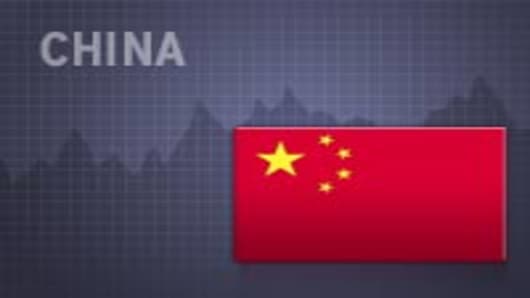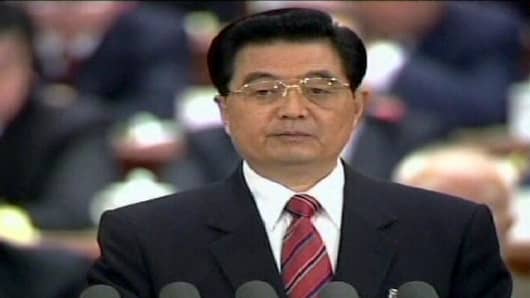Sustaining rapid growth is China's economic priority, President Hu Jintao said on Friday as an official survey pointed to a swoon in the all-important manufacturing sector.
In a sign of official concern that the world's fourth-largest economy is slowing too sharply, the central bank has authorized banks to increase their lending by 5 percent, banking sources told Reuters on Friday. The targeted easing could release around 200 billion yuan ($30 billion) of fresh credit.
"We must maintain steady, relatively fast development and control excessive price rises as the priority tasks of macro adjustment," Hu told a select group of foreign reporters at the Great Hall of the People.
Hu was speaking a week before the opening of the Olympic Games, widely seen at home and abroad as crowning China's emergence as a major economic power.
China would press ahead with reforms to ensure that the "spiritual legacy" of the Games would be an enduring benefit for the country, Hu said in his first interview with Western media. "At the same time as constantly deepening reform of the economic system and achieving sound and fast economic and social development, we will continue pursuing comprehensive reforms, including reforms of the political system," the president said.
China's economy grew 11.9 percent in 2007, the fifth straight year of double-digit growth, but the pace of expansion slowed to 10.4 percent in the first half of this year as demand for China's exports softened and credit curbs kicked in.
The leadership of the ruling Communist Party signaled last Friday that the slowdown was too abrupt by saying its economic priority was to maintain stable growth, while fighting inflation. Previously, the party had stressed the need to prevent the economy from overheating.
Uncertainties
An official survey of manufacturers showed an apparently severe deterioration in the industrial sector last month.
The monthly purchasing managers' index compiled by the China Federation of Logistics and Purchasing fell to 48.4 from 52.0 in June. It was the first time that the reading had dropped below the boom-bust line of 50 since the survey was launched in 2005.
Hu said China had maintained solid growth in the first half despite fierce snowstorms that swept the south of the country in January and May's devastating earthquake in Sichuan, which killed more than 70,000 people.
"However, we have to admit that there are growing uncertainties and unstable factors in the current international environment. China's domestic economy is also facing increasing challenges and difficulties," he said.
Economists said factory closures and transport restrictions introduced to improve Beijing's air quality for the Olympics could have affected business sentiment.
A parallel survey of purchasing managers conducted for brokerage CLSA pointed to a much more modest slowdown. CLSA's index, after rounding, was unchanged in July at 53.3.
"The PMI suggests that the slowdown in output and orders continues. However, it is gradual and activity is coming off a high base," said Eric Fishwick, head of economic research at CLSA.
Gloomier Outlook
Other economists took a more pessimistic view.
Mingchun Sun, an economist at Lehman Brothers in Hong Kong, noted that the sub-index for new export orders in the official survey fell in July for the fourth consecutive month.
"It is consistent with anecdotal evidence that tens of thousands of manufacturing firms have either shut down production or completely exited the business," Sun said in a report.
Qian Wang with JPMorgan Chase in Hong Kong said it was difficult to reconcile the discrepancies in the two surveys but concluded that the risk of a sharp slowdown was growing.
"The outlook for China's industrial sector is more gloomy, given the further downshift in global demand and financial market turmoil, elevated energy/raw material prices, and a still tight credit environment domestically," she said.
Banking sources said the central bank had instructed banks to funnel the extra loans they are permitted to make to the agricultural sector and to small businesses, which have been particularly hard hit by the credit crunch.
"This is a good gesture. At least it will satisfy to some extent the clients we have queuing for funds," one source said.
The People's Bank of China informed banks that it was loosening the lending straitjacket on Thursday, the same day that Beijing increased tax rebates for textile and clothes exporters.
The central bank is also helping exporters by slowing the pace of the yuan's rise to a crawl. The currency gained only 0.33 percent against the dollar in July, its smallest monthly rise since March 2007, and actually fell a little on Friday.
Chinese stocks continued falling on Friday because of worries about the weakening economy.



